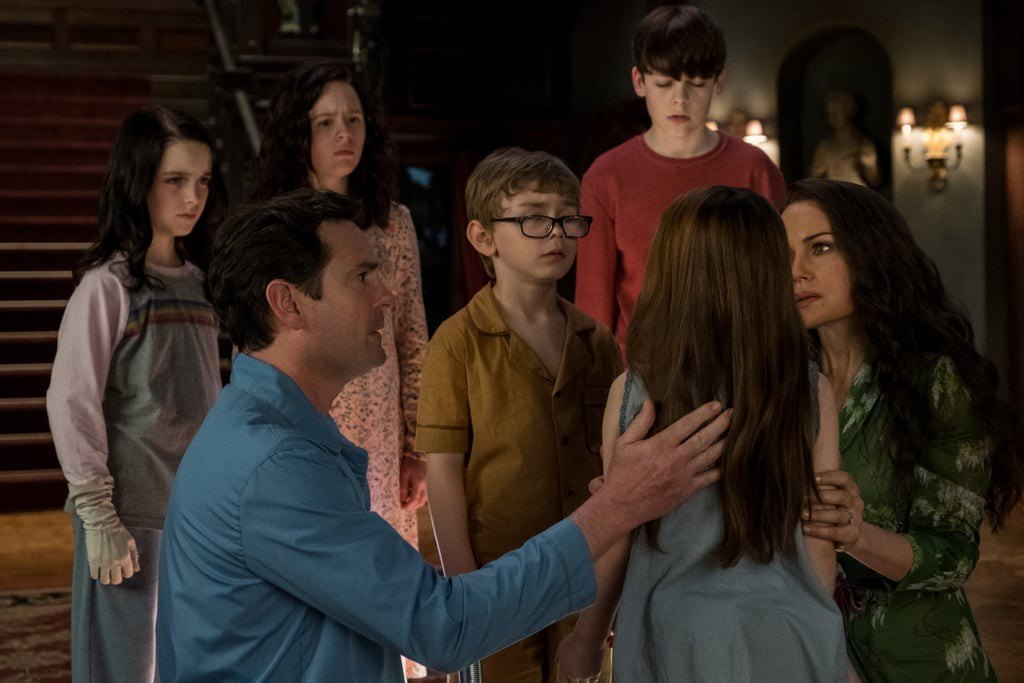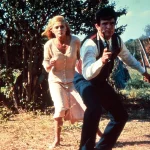The Haunting of Hill House (2018)

In 2018, Netflix released a horror series that transcended the genre and captivated audiences with its intricate storytelling and emotional depth: “The Haunting of Hill House.” Created by Mike Flanagan, this adaptation of Shirley Jackson’s 1959 novel is far more than a typical ghost story. It is a rich, multi-layered exploration of trauma, family dynamics, and the enduring effects of past experiences. Through its complex narrative structure and deeply developed characters, the series stands out as a modern classic in the realm of psychological horror.
At its core, “The Haunting of Hill House” tells the story of the Crain family, who experience a series of traumatic events while living in the eponymous mansion. The plot unfolds across two timelines: one following the Crain family during their time at Hill House in the late 1990s, and the other focusing on their adult lives in the present day as they confront the lingering ghosts of their past. This dual-timeline structure adds layers of complexity, revealing the ways in which past traumas continue to haunt and shape the characters’ lives.

The series is notable for its sophisticated narrative approach. It expertly interweaves supernatural horror with profound psychological and emotional themes. While the ghosts of Hill House are undeniably terrifying, the true horror of the series lies in the personal demons and unresolved issues of the Crain family. The supernatural elements serve as a vehicle for exploring themes of grief, mental illness, and familial relationships. The house itself becomes a character, representing the accumulation of the family’s collective trauma and unresolved conflicts.
Character development is one of the series’ greatest strengths. Each member of the Crain family is portrayed with depth and nuance, making their struggles and fears relatable and compelling. The show delves into their individual experiences, revealing how their childhood experiences at Hill House have shaped their adult lives. From the eldest sibling Steven, who becomes a skeptic and author, to the emotionally scarred Eleanor, the series provides a deep psychological portrait of each character. Their interactions and personal growth are central to the narrative, making their eventual confrontation with the ghosts of their past all the more poignant.

The performances by the ensemble cast are remarkable. Victoria Pedretti’s portrayal of Eleanor Vance, or “Nell,” stands out for its emotional intensity and depth. Her depiction of a woman grappling with both her internal demons and the external horrors of Hill House is both haunting and heart-wrenching. Likewise, the performances by the rest of the cast, including Carla Gugino, Mckenna Grace, and Oliver Jackson-Cohen, contribute to the series’ rich emotional texture. Their ability to convey complex emotions and personal traumas adds authenticity to the story, enhancing its impact on viewers.
Visually, “The Haunting of Hill House” is both stunning and unsettling. The cinematography by Michael Fimognari and the direction by Mike Flanagan combine to create a visually striking and immersive experience. The series employs long, uninterrupted takes and meticulously crafted set pieces to heighten the tension and create an atmosphere of dread. The house itself is portrayed with a sense of grandeur and menace, its dark, labyrinthine corridors and hidden spaces contributing to the overall feeling of claustrophobia and unease.
The show’s use of sound and music further amplifies its emotional and psychological impact. The haunting score by The Newton Brothers complements the eerie visuals, while the carefully chosen sound design intensifies the atmosphere of suspense. The combination of these elements creates a sense of unease that lingers long after the credits roll.

In addition to its horror elements, “The Haunting of Hill House” excels in its thematic exploration of family and memory. The series examines how trauma is transmitted across generations and how families cope with loss and unresolved issues. It poses profound questions about the nature of fear, the process of healing, and the impact of the past on the present. The series’ emotional depth and complexity elevate it beyond a typical horror story, making it a powerful and thought-provoking drama.

In conclusion, “The Haunting of Hill House” is a masterful blend of horror, psychological drama, and family saga. Through its intricate storytelling, exceptional performances, and atmospheric direction, it offers a profound exploration of human fears and familial bonds. It is a testament to the power of horror as a genre to delve into the deepest corners of the human psyche, making it a standout work that resonates with audiences on multiple levels.











